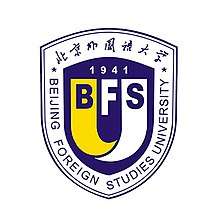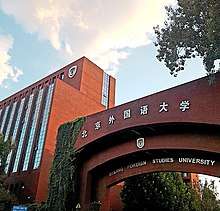Beijing Foreign Studies University
Beijing Foreign Studies University (Chinese: 北京外国语大学; pinyin: Běijīng Wàiguóyǔ Dàxué), commonly known as Beiwai (Chinese: 北外) in Mandarin and BFSU in English, is a university in Beijing, China. BFSU boasts of the oldest language programs in China, offering the largest number of foreign language majors on different educational levels. Located in Haidian District of Beijing, BFSU is divided into two campuses – west and east. BFSU is China's pre-eminent research university specializing in foreign studies according to recent collegiate rankings.[1] It is a Chinese Ministry of Education Double First Class Discipline University, with Double First Class status in certain disciplines.[2]
北京外国语大学 | |
 | |
| Motto | 兼容并蓄 博学笃行 |
|---|---|
| Type | National |
| Established | 1941 |
| President | Yang Dan |
Academic staff | 2,428 |
| Students | 8,579(932 international students) |
| Undergraduates | 5,088 |
| Postgraduates | 2,559 |
| 440 | |
| Location | , |
| Campus | Urban |
| Website | www |

| Beijing Foreign Studies University | |||||||
|---|---|---|---|---|---|---|---|
| Simplified Chinese | 北京外国语大学 | ||||||
| Traditional Chinese | 北京外國語大學 | ||||||
| |||||||
BFSU ranked the 17th out of 2,965 universities in China according to the statistics conducted on scores of test takers from 2012 to 2019 for the National College Entrance Examination (Gaokao).[3]
UniRank™ world university ranking said BFSU ranked the 317th in 2020.[4]
According to QS (Quacquarelli Symonds) world university rankings, BFSU ranked the 751-800th in 2019.[5]
BFSU alumni are well-known for Chinese diplomacy circles, the Ministry of Foreign Affairs in China. Around 400 ambassadors and over 1,000 counselors graduated from BFSU. BFSU is thus known as “Cradle of Diplomats”.[6]
BFSU was affiliated with the Ministry of Foreign Affairs from its establishment in 1941 to the early 1980s and was classified a key university under the Ministry of Education. BFSU is praised for offering the widest range of language studies in China: as of December 2016, there are 84 foreign languages being taught in this university.[7]
BFSU qualified for the first round of the competition in its efforts to enter Project 211, a university development programme launched by the Ministry of Education in 1996.[8] BFSU is directly under the leadership of the Chinese Ministry of Education. BFSU is one of China’s top universities listed under “Project 985 platform” and “Project 211”. Both government-sponsored campaigns selected BFSU to governmentally support BFSU.[9]
BFSU has more than 1,000 international students from all over the world, more than 100 countries. Especially, South Korean, German, Malaysian (IBS) and Japanese students (School of Chinese Language and Literature) are the largest ethnic groups on campus. Some foreign students study only in Mandarin with Chinese students but most of the foreign students select international business school undergraduate program which is taught in English and can take Chinese language courses. More than 70 years, over 90,000 people have graduated from the Beijing Foreign Studies University.[10]
A Chinese French novelist Gao Xingjian, who was awarded the Nobel Prize for Literature "for an oeuvre of universal validity, bitter insights and linguistic ingenuity." graduated from the department of French, Beijing Foreign Studies University.[11]
Schools and departments
Teaching Institutions
- International Business School (IBS)
- School of International Relations and Diplomacy (SIRD)
- School of English and International Studies (SEIS)
- School of Law (BFSULAW)
- School of English for Specific Purposes (SESP)
- School of European Languages and Cultures (SELC)
- School of International Journalism and Communication (SIJC)
- School of Asian Studies
- School of African Studies
- School of Arabic Studies
- School of Russian
- School of Marxism
- School of Chinese Language and Literature
- School of Art and Research
- Graduate School for Translation and Interpreting
- School of French
- School of German
- School of Spanish and Portuguese
- School of Japanese
- School of Computer Science
- School of Physical Education
Research centers
- National Research Center for Foreign Language Education[12]
This centre has so-called corpus researchers.[13] They have compiled corpora, such as simple Chinese English learners' corpora, and parallel corpora of Chinese-English translation. They have some corpora on the CQPweb.[14]
- Center for Central and Eastern European Studies
- Center for Japanese Studies
- British Studies Center
- Canadian Studies Center
- National Research Center for Development of Language Aptitude
- Beijing Cultural Exchanges and World Culture Research Base
- Joint Innovative Center for Outbound of Chinese Culture
- China Language Assessment
- Institute for Global History
- Beijing Center for Japanese Studies
- National Research Center of Overseas Sinology
- Research Institute of Foreign Literature
- Research Institute of Foreign Languages
- Institute of International Studies
- World Language and Culture Research Center
- Center for Public Diplomacy Studies
- Research Center of The United Nations and International Organizations
- Center for Chinese and Foreign Anti-Corruption Legal Research
- Information Center for Worldwide Asia Research
- Institute for Higher Education
- BFSU Center for Education Law
- African Language and Culture Studies Center
- Silk Road Research Institute
- BFSU Center for Intellectual Property Law
- BFSU Zayed Center for Arabic Language and Islamic Studies
- Center for Deutsche Culture
- Russian Language Center
- Center for International Dispute Settlement
- Center for American and English Legal Studies
- BFSU Off-Campus Law Training Base
- BFSU Canadian Studies Center
- BFSU Center for Belgian French Studies
- Quebec Studies Center
- BFSU Swiss Studies Center
- Center for Translation Language and Culture
- Center for East-West Relations
- Center of Gender and Global Studies(CGGS)
- Research Center for Business English
- Center for Cross-Cultural Management Studies
- Center for Institutional and Industrial Studies
- Research Center for Corporate Organization and Strategy
- Center for Management Studies
- Research Center for World and National Economics
- Institute of International Finance and Business
- Center for G20 Studies
- Center for Central and Eastern European Studies
- Finnish Studies Center
- National Research Center for Online Foreign Language Education
- Center for West Asian and African Studies
- Center for Southeast Asian Studies
- Center for ROK and DPRK Studies
- Korean Language Teaching and Research Center
- Center for South Asian Studies
- Sirindhorn Institute of Language and Culture
- Malay Research Center
- Chinese American Literature Research Center
- Center for Linguistics and Applied Linguistics of the School of English and International Studies
- Center for English and American Literature
- American Studies Center
- Center for Translation Studies
- British Studies Center
- Australian Studies Center
- Irish Studies Center
- Canadian Studies Center
- International Communication Studies Center
- Inter-Cultural Studies Center of the School of English and International Studies, BFSU
- Center for Diaspora and Transnational Studies
- Committee for Teacher Professional Development, SEIS
- Institute of World Economy
- Institute of Philosophy and Culture
- BFSU Center for Yijing and Confucius Studies
- Center for Culture Industry
- Information Center for International Chinese Teaching
- Center for Comparative Literature and Inter-Cultural Studies
- BFSU Research and Development Center for International Chinese Teaching Resources
- Research Center for English for Specific Purposes
- China-Canada Culture and Education Exchange Center
- Sri Lankan Studies Center
- Indonesian Studies Center
- Center for Latin Language and Culture
- Polish Studies Center
- Center for Omnimedia Studies
- Center for Media Ethics and Policy Research
- Mexican Studies Center
- Research Center for Francophone Countries and Regions
- Center for Nordic Studies
- China-Africa Center for Law Studies
- Research Center of Contemporary French Literature
History
- 1941 - Chinese Military and Political University
- 1946 - North China United University
- 1948 - North China University
- 1954 - Beijing Foreign Languages Institute(Chinese: 北京外国语学院)
- 1981 - Established Foreign Students' Chinese Learning Department
- 1984 - Established Beijing Japan Research Center
- 1994 - Beijing Foreign Studies University(Chinese: 北京外国语大学)
- 2017 - Listed on World Top Class Discipline of Ministry of education
References
- "高校排名:2014年中国语言类大学排行榜". Retrieved 30 September 2015.
- "教育部 财政部 国家发展改革委 关于公布世界一流大学和一流学科建设高校及建设 学科名单的通知 (Notice from the Ministry of Education and other national governmental departments announcing the list of double first class universities and disciplines)".
- "【2018版中国大学近5年录取分数排行榜】". Huadong Normal University. Retrieved 2 July 2018.
- "BFSU world rank". uniRank™. Retrieved 20 January 2020.
- "Beijing Foreign Studies University Rankings". QS World University Rankings. Retrieved 6 July 2018.
- "大学简介". 北外官方网. Retrieved 30 March 2018.
- "全国重点大学都有哪些". Research and development in China(中公考研). Retrieved 2 July 2018.
- "网站地图—中国教育在线". www.eol.cn. Archived from the original on 2009-06-24. Retrieved 2018-09-03.
- "211工程大学名单". China Education Online Service (中国教育在线). Retrieved 27 January 2019.
- "大学简介". 北外官方网. Retrieved 30 March 2018.
- "The Nobel Prize in Literature 2000". Nobelprize. October 7, 2010. Retrieved October 7, 2010.
- "中国外语教育研究中心". www.sinotefl.org.cn. Retrieved 2016-02-25.
- "Home Page | 北外语料库语言学". www.bfsu-corpus.org. Retrieved 2016-02-25.
- "CQPweb Main Page". 111.200.194.212. Retrieved 2016-02-25.